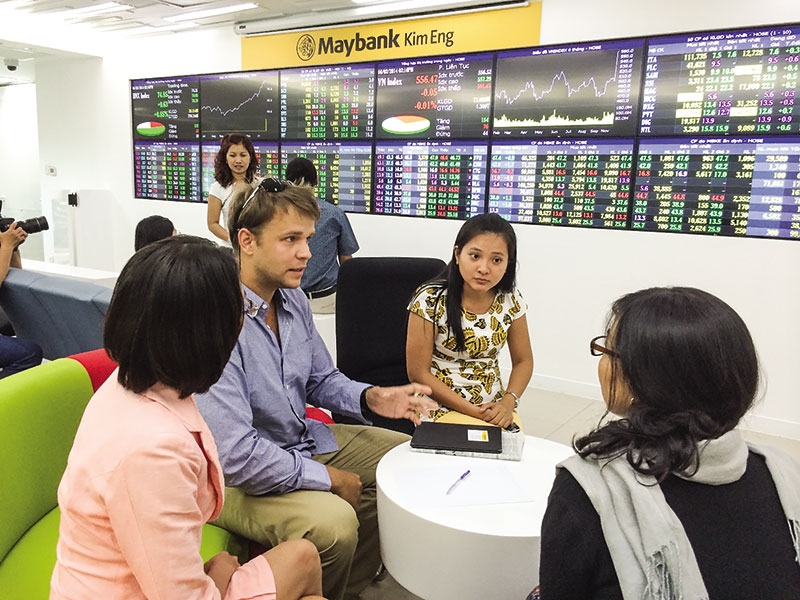Investors still bet big on a bearish stock market
 |
| The US-China trade war may be one of the main reasons for the recent poor performance of the Vietnamese stock market |
A downbeat tone
The corrective period of Vietnam’s stock market is extending into its third month, as the main gauge VN-Index fell below 900 points on July 5, to 899. The majority of blue chips, especially those of banks and oil firms, lost their value by 5-6 per cent in only one trading day, bringing the entire market down. Daily liquidity also plummeted from VND10 trillion ($434 million) to VND3 trillion ($140.4 million).
On July 11 and 12, the market showed early recovery signs as the VN-Index gained 0.6 per cent, but the market gauge still remained under the 900-point mark (at 898.51 points). This means the VN-Index has lost 25.84 per cent of its value since April 9, when it hit its record high of 1,204.33 points. Due to these drastic falls, Vietnam has been ranked as one of the 10 worst-performing stock markets in the world, a complete contrast to the euphoria seen in the first quarter of 2018.
Many reasons have been put forward for this change in fortune, but observers believe that panic over the tit-for-tat trade war between China and the US is a major factor. Investors, especially Vietnamese individuals, are worried about the spillover effects of this war on Vietnam’s currency and export activities, and ultimately the prospects of listed Vietnamese firms.
To complicate matters, data from ANZ Bank showed that global capital has been flowing out of Asia’s emerging markets (excluding China) in the past three months, totalling $9.7 billion. Khoon Goh, head of Asia Research at ANZ, said that the US Federal Reserve is also poised to hike rates more frequently this year, which traditionally triggers investors to leave emerging markets and turn to US-based assets.
Still an attractive market
Experts and industry insiders have voiced their concerns over the currently bearish market. Last week, chairman of the State Securities Commission Tran Van Dung issued an advisory note, asking investors to remain calm.
According to Dung, the double effect of a Fed rate hike and the US-China trade war has negatively impacted the Vietnamese stock market, though the macro-economics of Vietnam remain stable.
“I have a feeling that many local investors are overreacting to international news, the outflow of foreign investors, and some volatilities in the VND,” Dung said.
He argued that amid a strong macro-economic backdrop, the mid- to long-term prospects of Vietnam’s stock market are good.
Specifically, in the first half of 2018, GDP grew by 7.08 per cent, and 86 per cent of listed companies reported positive earnings for the second quarter. In the year to date, investors from overseas have invested $2.28 billion, which Dung said is positive as the figure was only $2.92 billion for the entire year of 2017.
In its daily note on July 11, Viet Capital Securities said it is “still watching for potential risks of climbing trade tension”. The brokerage acknowledged that Vietnamese firms could be under pressure as their Chinese rivals look for new markets. However, Viet Capital Securities has high expectations on Vietnam’s free trade agreements with various countries and economic zones and a subsequent shift in manufacturing from China to Vietnam.
“Vietnamese companies could benefit from the trend of foreign companies shifting factories or outsourcing from China to Vietnam to take advantage of affordable labour costs and a long list of trade deals that Vietnam has with other countries,” said head of research Barry Weisblatt.
In fact, while the listed market went downhill, foreign investors still participated in the first-time sales of Vietnamese industry leaders, from property developer Vinhomes JSC (raised $1.3 billion from Singapore’s sovereign wealth fund GIC) and digital media firm Yeah1 Group ($100 million from various investors) to commercial bank Techcombank ($922 million from the likes of Warburg Pincus).
“With the recent falls in valuation, Vietnam’s companies are becoming more reasonably priced, with a good earnings-per-share ratio. Moreover, the capital market has experienced strong growth in recent years for both equities and bonds,” noted Dominic Scriven, executive chairman of Dragon Capital.
Scriven, who has 20 years of experience in Vietnam, said he believed in the prospects of Vietnamese firms and hoped to see more high-profile sales, from major firms and state-owned entities alike, in the near future.
What the stars mean:
★ Poor ★ ★ Promising ★★★ Good ★★★★ Very good ★★★★★ Exceptional
Related Contents
Latest News
More News
- Vietnam entering a new growth phase in 2026 (January 28, 2026 | 10:02)
- SHIFT project launched to steer capital towards green growth (January 28, 2026 | 09:52)
- GEVA a launchpad for Vietnam’s agricultural exports (January 26, 2026 | 12:03)
- France supports Vietnam’s growing role in international arena: French Ambassador (January 25, 2026 | 10:11)
- Russian President congratulates Vietnamese Party leader during phone talks (January 25, 2026 | 09:58)
- Fitch upgrades Vietnam's long-term senior secured debt instruments (January 23, 2026 | 23:35)
- Fitch Ratings upgrades Vietnam’s senior secured long-term debt rating to BBB- (January 23, 2026 | 16:30)
- List of newly-elected members of 14th Political Bureau announced (January 23, 2026 | 16:27)
- List of members of 14th Party Central Committee announced (January 23, 2026 | 09:12)
- Highlights of fourth working day of 14th National Party Congress (January 23, 2026 | 09:06)

 Tag:
Tag:





















 Mobile Version
Mobile Version